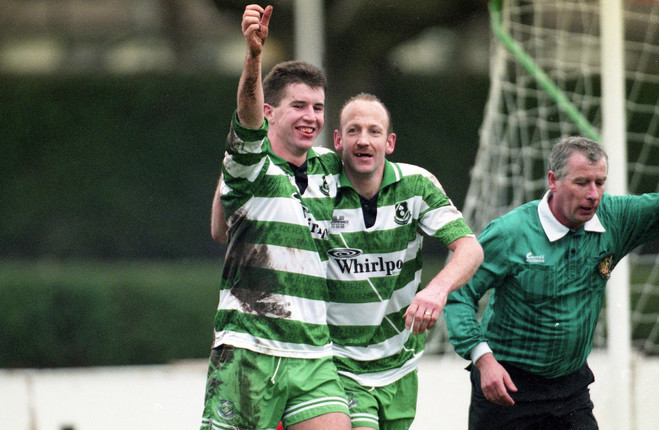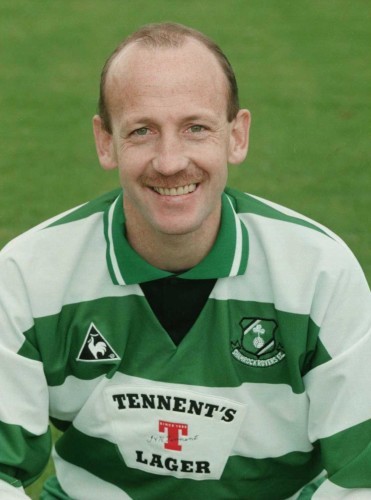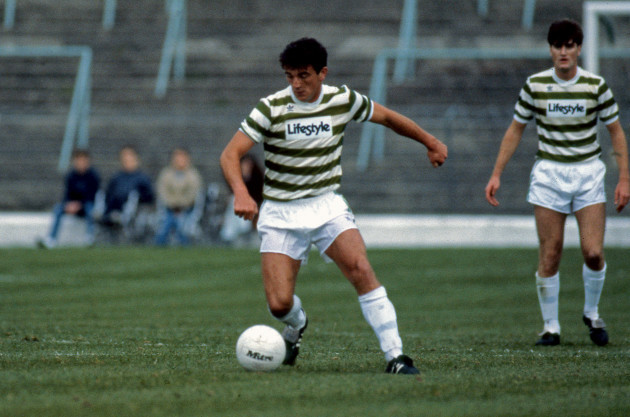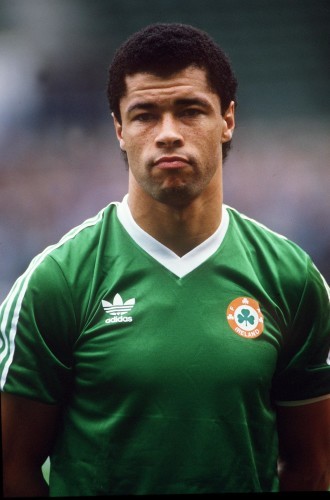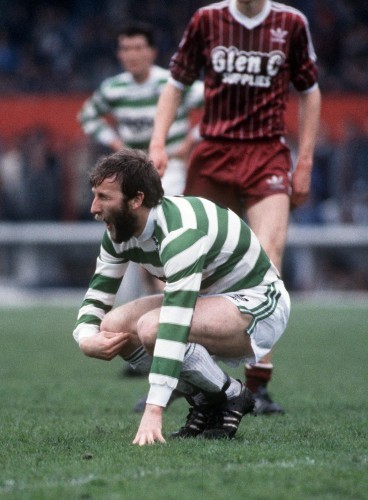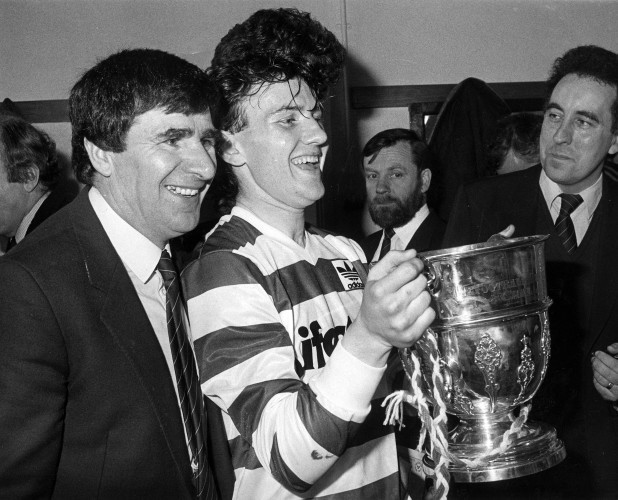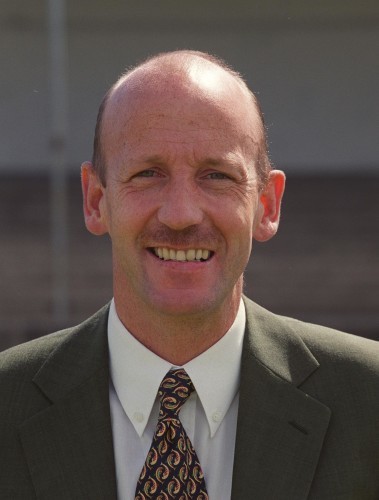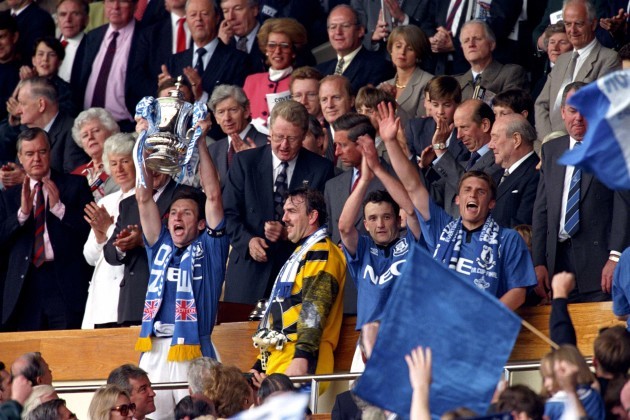Updated at 09.14
TERRY EVISTON CONSISTENTLY stood out on the football pitch — but it wasn’t always for his footballing ability.
The former Dundalk and Shamrock Rovers player remembers a game early in his career with Bohemians.
“I was out of college and I had a beard and a bit of an afro head on me, but [the late RTÉ Radio football commentator] Philip Green referred to me as the ‘Karl Marx of the left-wing’. Phil was great for those comments, he really was.”
To be fair, Eviston had the talent to back up his somewhat flamboyant appearance back in the day. His feats over the course of a 23-year career as a player in the League of Ireland include four league titles (two apiece with Dundalk and Shamrock Rovers), three League of Ireland Cups, one FAI Cup, one President’s Cup, two Leinster Senior Cups and the Soccer Writers’ Personality of the Year award.
Yet despite the countless achievements, rather than the trophies, it is the stories and the craic over the course of his time in football that he gets most animated about during our discussion.
And from going down to play Cork as a youngster and being warned “I’ll break your fucking leg boy” by a no-nonsense defender to “sporting this ridiculous moustache” while appearing next to Zig and Zag on ‘The Den’ (a much-missed long-running RTÉ children’s television show), Eviston certainly has plenty of stories to tell.
1. Learning his trade
The Dubliner’s love affair with the beautiful game started in the 1960s and continues to this day. With a sparse attendance watching on, he would line out as a youngster in Killester Park, representing ”the top of the road” in their regular games against “the bottom of the road”.
“Things got really hot and heavy,” Eviston reflects of those fiercely contested matches in his estate, as he begins an hour-long chat with The42.
“My earliest memories would be there, and also back gardens. A friend of mine had the nets up in his back garden.
Kids are spoiled today with PlayStations and all that kind of stuff. For us, it was the net — hitting the ball into the net was something else.”
Eviston’s first experience of organised football was with St Martin’s Boys, who played in Donnycarney in Maypark, or ‘The Jungle,’ as it was more commonly known.
“Only recently, two of the stalwarts, Paddy Kerr and Johnny Chambers, passed away,” he says.
“When you look back at the schoolboy coaches giving up their time — without them, there wouldn’t have been anything.”
2. A home away from home
Aged 17, Eviston signed with Home Farm — then a League of Ireland side — under Charlie Walker, alongside other youngsters who went on to have good careers in the game, including Harry McCue and Noel King.
“Noel got on the bench for the famous Home Farm cup final win over Shels [in 1975],” he adds.
Charlie was a larger-than-life character. He was a great man manager. At that particular time, he was great for me. I opted out, as I was doing my Leaving Cert as a youth in Home Farm. He was constantly phoning and when you think back, it was a nice little antidote to study, taking it all out on the football. So I ended going back to them after Christmas having left the youth team.
“So Charlie was a great influence, alright. He brought a whole new professionalism to things — I think he was the first guy to bring cones around [to training].”
It was the start of a lengthy stint in the League of Ireland and Eviston could have progressed to an even higher level had things worked out differently. The winger caught the eye when playing a friendly against a Jock Stein-managed Scotland side “around ’79″. Burnley, who had recently been relegated to England’s second tier, were interested in signing him — info Eviston himself didn’t discover until years later.
On the possibility of getting a big move to England, he continues: “I was studying to be a teacher at the time, but playing football at the highest level in Ireland was a dream for me.
“You never lost sight of that — you were doing something that you really loved doing. It wasn’t as professional as it is today, but certainly we had a great sprinkling of decent talent and characters in the game. It’s something that I have absolutely no regrets about being involved in. I think there’s a lot of luck involved if you get away as well. There’s a much bigger net being cast now, so anybody who is half-decent gets over and has a go, has a trial. In my day, it wasn’t as easy to get over.”
3. A special talent
Despite staying in Ireland, Eviston did come up against a couple of players who would go on to become world-class stars in the game. In the early 1980s, he faced a young Paul McGrath, who spent a year at St Patrick’s Athletic, before moving to Manchester United, with the defender going on to win 83 caps for Ireland and becoming a legend of the game.
“[McGrath] was unusual in the sense that Charlie had picked him up from junior football. I think he was playing out in Dún Laoghaire. It just happened for Paul, and it was great to see him [do well], because I remember playing against him many a time.
“He didn’t have to go over [to England] when he was 14 or 15 — that seemed to be the trend in the past. He could learn his trade here and then get over.
“Kevin Moran was much the same [in terms of what he went on to achieve], he would have been playing with UCD. He was a strong lad, but you never would have imagined him playing at the level he did play.
Paul was a bit more Mercedes-like. He was something. He was different, I think he proved that. He was just a natural. He knew where to go, he knew when to run with the ball, he knew how to tackle, he was just all-round [brilliance]. I think he did it intuitively and didn’t need a lot of coaching. He was just very good at what he did.”
And McGrath wasn’t the only future Irish legend Eviston came across over the course if his career.
“I remember playing against [Roy Keane], when he had signed for Forest, I was with Dundalk at the time.
“But I remember talking to him at a PFAI do a while back. He was sharp as a razor, because he pinpointed the year we played them at Oriel Park. [Brian] Clough was the manager.
“He was your box-to-box midfielder, he was young, and just had sheer physical presence. At one stage, he went by me, making a run from deep in midfield. The only way I could explain it was it was as if this plane had gone by and I was caught in the draft of it — it was just the sheer energy of it.
“So I wasn’t surprised how well he did at Forest after that. It was something to behold. I just felt: ‘Jeez, I have a long way to go to match his physical strength.’
“He was powerful. He put on the bulk afterwards, but I’d say he’d been with Forest maybe a year or two at this stage.”
4. The school of hard knocks
After three years with Home Farm, a 21-year-old Eviston joined Bohemians, who were managed by Billy Young at the time. And it was during his five years at Dalymount Park that the winger began to really establish himself as one of the top players in the country, scoring 31 league goals in over 100 appearances overall.
“As regards enjoyment factor and playing, my first game with Bohs was down in Cork. It was the first league game. They had a back four of Martin Sheehan, he was like someone who was lured down in the mountains, there was a red beard on him, and Noel O’Mahony, God rest him. He was later Cork manager. The two of them were tough as nails.
“Then you had the two full-backs, John Herrick and John Brohan, a tougher back four you could not meet, and I was thrown in as a youngster.
The intimidation was awful. It was very tough. ‘I’ll break your fucking leg boy.’ You’re thinking: ‘Jaysus, where’s he coming from?’ It was nearly like playing against Dermot Keely, you always looked over your shoulder to see: ‘Where the fuck is he?’ You know?
“Then you had the Dundalk team, their back four was superb as well. It was Paddy Dunning, Tommy McConville, Dermot Keely and Martin Lawlor, you didn’t mess around with them.
“I nearly joined Dundalk [after Home Farm], but I remember talking to [the manager] Jim McLaughlin in the Skylon [Hotel] in Drumcondra. I said: ‘It would be easier to train in Dublin than going up to Dundalk.’ Anyway, these are the decisions you make in life.”
Eviston instead moved to a Bohs side that had just won the league title, but also subsequently lost key players, including Pat Byrne and Fran O’Brien, both of whom would represent Ireland at senior level.
Young’s up-and-coming team frequently challenged for honours. They finished in the top three twice during Eviston’s time there, while despite only being in his mid-20s, the Dubliner was made captain near the end of the stint. His last game was the 1983 FAI Cup final at Dalymount Park, which they lost 2-1 against Sligo Rovers, and there is a lingering sense of disappointment that for all the side’s talent, Eviston claimed just a single major trophy, the League of Ireland Cup, during his time there.
5. Across the great divide
In 1983, Eviston decided to make the move to fellow Dublin side and bitter rivals of Bohs, Shamrock Rovers. The transfer was not received well by supporters, to put it mildly. And in hindsight, he admits to struggling to cope with the pressure brought on by this controversial switch.
A certain anxiety, coupled with injury problems, meant Rovers never saw the best of him during his first stint there. He still managed to win a league title, the first of his career, as Jim McLaughlin’s side began their famous ‘four-in-a-row’. After a year and a half at Glenmalure Park though, he was “bombed” out. So any success he enjoyed at Milltown was bittersweet and short-lived.
“Going from Bohs to Rovers was just like sacrilege,” he says. “You just didn’t do it. It was all a bit much for me.
“Jim McLaughlin had come down from Dundalk, which was a huge move for him. He signed all the best players in the country basically.
“I was injured most of the time. There was one match to win the league, it was in Glenmalure, I had gone over on my ankle a couple of weeks beforehand. At this stage, I had so many injuries that McLaughlin thought I was just faking it.
He said: ‘How are you fixed?’ I said: ‘It’s still very sore.’ He said ‘just take that’. It was actually a protein tablet, Vivioptal. It went out years ago, as it was a pain-killer. I knew what it was as well.
“I got the league medal and we were beaten in the cup final that year [by UCD] as well. At that stage, the writing was on the wall for me — it wasn’t really happening.
“I think McLaughlin had regretted buying me. I had gone for a fairly decent fee across the divide from the north side to the south side so to speak — that was a huge burden at the time.
“I was 25, I should have been well able to cope with it. But it was pretty hard going, especially when you came up against both sets of supporters — Bohs for leaving them and Rovers when I was there, because I was coming from Bohs.
“If you’re in any way brittle, which I was at that stage, it kind of gets to you. Psychologically, it got to me a little bit. I never realised my potential there, whereas I should have.”
He continues: “If someone had just grabbed me by the scruff of the neck the first time at Rovers and said: ‘Will you bloody well relax? Go out for a few pints before the game if that’s what you need to do, you’re there to go out and enjoy yourself.’
“So, despite the first [league winners' medal], I don’t really consider myself as part of that four-in-a-row.”
6. One step back, two steps forward
Following the Rovers debacle, Eviston went “back to basics” and joined Athlone, where he linked up with Turlough O’Connor, a League of Ireland legend in his own right, with the manager going on to have a significant influence on the out-of-sorts winger’s career.
At St Mel’s Park, tactical instructions were limited, and O’Connor gave Eviston “free rein,” which enabled him to thrive.
“I suppose Athlone really revived my career from being down in the pits,” he says.
Two years later, Eviston followed O’Connor to Dundalk, where he would spend seven years and reach his footballing peak in the process. Despite being almost 30 by the time he joined the Lilywhites, Eviston was a late developer and it was only around this point that he really began to fulfil his potential.
Unlike during the failed Rovers stint, the new recruit took little time to make an impression at Oriel Park. When the team won the double in the 1987-88 season, he was named the Soccer Writers’ Personality of the Year, in addition to claiming the league title again in 1991 and two League of Ireland Cups (1987 and 1990). He scored 40 goals overall for the club, which was helped by the fact that as he grew older, Eviston tended to gravitate from the wing to a centre-forward position.
I suppose when you’re younger, you have all sorts of things going on, you’re getting married and having kids, so you just get a grounding and appreciation of what matters [once you get older].
“You grow up and you just treasure every moment of it. But certainly, the medals for Dundalk, I earned them and was part of them.
“I was always a winger [before] and I just went on a run of goals. Any striker will tell you need to be scoring goals and if you have a barren period and it lasts any length of time, you start to question yourself.
“I don’t know what it was, [I suppose] it was the release of being back playing again with a freedom… I was free to roam around up front and just do what I pleased basically.
“When we won the double, it was as close as you’ll get to playing in England, going on an open-top bus, the crowds in the streets of Dundalk, it was just phenomenal and something you’ll never forget being a part of.”
7. European dream
In addition to the domestic success, there were a couple of memorable Europe nights, with the Lilywhites taking on some top sides at the time, including Ajax, Red Star Belgrade and Honved FC.
“I remember with Dundalk, we played Kispest Honved and there was a guy called Ricky McEvoy playing for us, he played for Rovers as well.
“We were underdogs and lo and behold, we break away and Ricky unleashes a volley and scores. We’re all looking at each other and saying: ‘What’s after happening here? We’re winning the game.’ It was backs to the wall, at that stage, I was still playing on the left, and I don’t think we got outside our 18-yard box — we were defending for our lives.
We came in at half-time and I’ll never forget the expression on everybody’s face, a fearful look of: ‘Oh shit, how are we 1-0 up?’ It was always backs to the wall in European games.”
Given that even the top League of Ireland clubs were invariably part-time during that era, they unsurprisingly struggled more often than not in these extremely challenging circumstances.
“I was at [former St Pat's and Dundalk player] Joey Malone’s 60th there recently and [ex-Dundalk and Shamrock Rovers goalkeeper] Alan O’Neill was talking about [Paul Newe] passing the ball back to him and he actually scored an own goal. It was around 30 yards out, it sailed over Alan’s head.
“Ajax actually beat us 2-0 at home. Frank Stapleton was playing that time. I think he actually scored as well. They beat us 4-0 away. Frank Rijkaard was playing as well. Those nights were brilliant, a packed Oriel Park was great.
“Then, for the pre-season friendlies, you had brilliant games as well. We had a game against Liverpool. At this stage, I was 35, 36, I didn’t think I’d be involved at all. It was a League of Ireland selection against Liverpool. I remember ‘Razor’ [Neil] Ruddock was coming on and he said: ‘How you doing, old guy?’
“Pat Morley actually put us ahead in that game. I was on the bench. I came on for a cameo in the last 20 minutes. They equalised unfortunately. Graeme Souness was manager then, it would have been early ’90s.”
8. Superstar soccer
Other memorable occasions abroad included trips to far-flung places as part of a League of Ireland XI. In April 1980, Eviston was in the side that faced Argentina at River Plate Stadium. A young 19-year-old lad by the name of Diego Maradona scored the winner. A little over a year later, the Irish winger was part of the travelling party to take on Brazil in Maceió.
The Argentina game, in particular, stands out in the memory. After all, Eviston and co were up against a team that had won the World Cup less than two years previously and would do so again in six years’ time.
“It’s clichéd at this stage, but we did extremely well,” he says. “We were only beaten 1-0 and [Maradona] scored the goal. I remember walking through the posh district in Buenos Aires the following day. The match was on telly and we were all outside looking in at the match.
“[Former Limerick City player] Pat Nolan was marking Maradona — I think Pat still has his jersey. I got the number four jersey, it was [Jorge] Olguin, he was the full-back at the ’78 World Cup.
Those trips were unique. I was teaching then at that stage. There were taxi drivers, shopkeepers, postmen [in the team]. We were just part-time. It was a marvellous opportunity for us to pit ourselves against these guys who were superstars.
“I suppose that’s one thing I’ll always miss — that buzz of your name being on a travelling party to go out and play these games. It was halcyon days for League of Ireland trips, brilliant trips.
“The Brazil game was close enough [to the Argentina trip]. We were hammered 6-0 and Zico got four goals. That was a week-long trip for one match. We travelled all the time. I think we got one overnight stay.
“So that made it for League of Ireland players. We were training Tuesday, Thursday, Saturday morning, match on Sunday — that was our routine.
“We didn’t really look further than that. We were happy to do it. You got the few bob, it helped me when I was getting married, it kept things going really, a little bit of an extension to the side of the house or something, it just kept you afloat.
“The ’80s were very difficult times for mortgages and stuff like that — the interest rates were 14 or 15%, we hadn’t got a bean. That added a different dimension to it, you know? Getting your few bob and it was a few bob, it wasn’t huge.”
And did his employers at the school approve of these frequent away trips?
“It was awkward. I had to get special leave. I wouldn’t get paid [by the school] for it, but we got expenses from the FAI or whatever. But I have to say that I was never stopped from going.
“Some lads went down to New Zealand, I missed out on that one — I had cracked my ribs [playing in a game].
“But we were all over the place — there was another one to Malaysia, it was a great time. I don’t think the lads now have the same opportunity.
“The preparation wouldn’t have been what you have now. It was more relaxed — that’s probably a euphemism.”
9. Like a fine wine
After the hugely successful spell at Dundalk, Eviston went some way towards making up for his disappointing stint at Rovers on his return there.
Aged 36, at a time when most players would be at least considering retirement, Eviston managed to enjoy some of the best moments of his career. In three years with the Hoops, the veteran star made 60 appearances, including a significant contribution to their league title win, 10 years on from first triumphing in the top flight with the Dublin side.
Under the management of a former Ireland international, the late Ray Treacy, Eviston enjoyed a rather spectacular footballing Indian summer playing in the RDS and featuring alongside the talented likes of Stephen Geoghegan, Paul Osam and John Toal.
“That was a real bonus, because when I was in my 30s, you could see the end coming.
We had a great team. We had a mixture of experience and younger fellas. Alan [O’Neill] in goal and John Toal in the middle of the park, Gheogho up front, myself knocking in goals, whereas my first time at Rovers, I couldn’t kick snow off a rope.
“To come back at 36, to be such a part of the team that won the league was fantastic.”
And it didn’t even end there. After leaving Rovers in 1996, he would play for two more seasons, with Athlone and Cobh Ramblers respectively, before eventually hanging up his boots at the age of 40.
“I actually finished my playing days in Cobh, believe it or not. People were saying: ‘What in God’s name are you doing going down there for at 40 years of age?’
“It’s just in your blood. You don’t know what to do at the weekend. To be honest, last night I was hovering around the house and I ended up going to watch a jazz band up in Raheny. It’s very hard to fill the vacuum and I’m out of the game a long time now.
“It’s that buzz of going training, the craic in the dressing room, match days, getting yourself right and not in my case, but letting the hair down after the game. It was a great cycle of playing football, win or lose.
“You become a bit… Institutionalised is probably the wrong word to use, but you become very accustomed to the routine.”
10. Managing expectations
After retiring (and even slightly before then), Eviston combined his day job as a teacher with coaching. He was briefly player-manager of both Shamrock Rovers and Athlone Town in the mid-to-late ’90s, and also spent a year in charge of Dundalk between 1999 and 2000.
In 2004, Eviston returned to the League of Ireland as an assistant manager to Roddy Collins at Dublin City, before following him to Shamrock Rovers later that same year. None of those jobs lasted for a sustained period, however, and he admits to finding the “politics” involved frustrating.
“I know some guys take to management, they love every minute of it and it becomes a bit of an addiction. I suppose if things had worked out differently, I might have stayed longer in it. But I didn’t.”
There was one further job for Eviston, however, and it saw him claim silverware for the first and only time so far in his managerial career. In 2013, he guided Raheny United Ladies (who have since merged with Shelbourne Ladies) to a FAI Cup triumph, as they beat Castlebar Celtic 3-2 after extra-time.
Women’s football in Ireland has made considerable progress since then, and Eviston was delighted to see Cork City — a team he remembers beating 9-0 — improve to the extent that they lifted the FAI Cup last year. However, five years ago, the game was not looking as healthy as it is now, and Eviston quickly grew disillusioned, owing to the lack of genuinely competitive fixtures.
There were two decent teams at the time, ourselves and Peamount, and after that, there was a huge gulf,” he says.
“We were unbeaten and it’s not that we were unbeaten against top-quality sides. To maintain sincere energy for that is quite difficult.”
But at 60, Eviston’s enthusiasm for football in general has not diminished by any means. He has a Uefa B license in coaching and when asked about the possibility of a return to the League of Ireland, he says “never say never”.
And interestingly, having retired from full-time teaching last year, Eviston recently spent time “doing a few coaching courses”.
11. The Royle treatment
Whatever the Dundalk legend does next is almost bound to be second-best to playing, however. During this interview, Eviston on more than one occasion notes the cyclical nature of his career — from flopping at Rovers to going back to the same club a decade later and silencing the doubters by winning an improbable fourth league title, to making one of his first appearances at Home Farm against Everton, his childhood team, and facing the same opposition for his testimonial nearly 20 years later. He remembers the latter occasion with particular fondness — the Toffees had just upset a Manchester United side, which included the young lad Eviston came up against at Forest, Roy Keane, beating the Red Devils 1-0 in the FA Cup final.
“They were a top side, but it was an end-of-season thing for them as well,” he explains. “They were in town for the weekend. But I remember we met the Everton team in Anabel’s [nightclub]. I was toing and froing, talking to Joe Royle or whatever.
“I had remembered going over to see Joe Royle [during his playing days] against Spurs in 1970, the year they won the league. The centre half for Spurs was kicking lumps out of him.
“I met him [after the testimonial] and said: ‘If you want to come back to the house…’ I didn’t think anything of it, but I remember the story ran in the paper afterwards in The Tribune — we were all there, [ex-Dundalk player] Barry Keogh, Alan O’Neill, a few friends to help me with the testimonial. We were having an old sing-song or whatever and the doorbell rings at 4am. It’s a taxi with Joe Royle and the backroom staff. We ended up having rasher sandwiches in the kitchen.
My youngest son Rory used to collect the Premier League stickers. I woke him up early and he said [pointing at Joe Royle] — I got him in the stickers.”
As we chat, Eviston looks proudly at a trophy presented to him in 1997 by Athlone Town to mark his 100th League of Ireland goal, a record that puts him in the all-time top 50 scorers in the competition. A year later, he would score his final goal at 40 — nearly 20 years ago now.
“The last one was down in Cobh, a diving header,” he says. “Someone said I was falling anyway, but I put it down to a diving header.
“I was like a kid when I scored, I’m a bit embarrassed looking back, the celebrations nearly took the wind out of me. The old fellas would say: ‘Let him go running, we’re going to save our energy.’ The simple things in life, hitting the back of the onion sack, it’s a great feeling for anyone who has played.”
The42 is on Instagram! Tap the button below on your phone to follow us!
